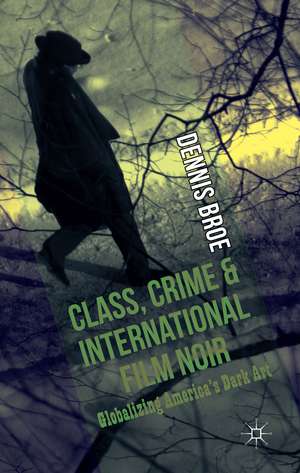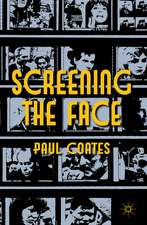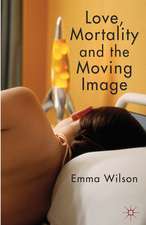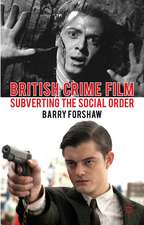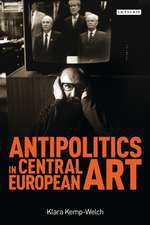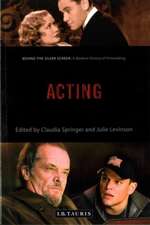Class, Crime and International Film Noir: Globalizing America's Dark Art
Autor D. Broeen Limba Engleză Hardback – 9 apr 2014
| Toate formatele și edițiile | Preț | Express |
|---|---|---|
| Paperback (1) | 382.95 lei 6-8 săpt. | |
| Palgrave Macmillan UK – 2014 | 382.95 lei 6-8 săpt. | |
| Hardback (1) | 390.63 lei 6-8 săpt. | |
| Palgrave Macmillan UK – 9 apr 2014 | 390.63 lei 6-8 săpt. |
Preț: 390.63 lei
Nou
Puncte Express: 586
Preț estimativ în valută:
74.75€ • 78.25$ • 61.85£
74.75€ • 78.25$ • 61.85£
Carte tipărită la comandă
Livrare economică 05-19 aprilie
Preluare comenzi: 021 569.72.76
Specificații
ISBN-13: 9781137290137
ISBN-10: 1137290137
Pagini: 256
Ilustrații: XVII, 233 p.
Dimensiuni: 140 x 216 x 19 mm
Greutate: 0.48 kg
Ediția:2014
Editura: Palgrave Macmillan UK
Colecția Palgrave Macmillan
Locul publicării:London, United Kingdom
ISBN-10: 1137290137
Pagini: 256
Ilustrații: XVII, 233 p.
Dimensiuni: 140 x 216 x 19 mm
Greutate: 0.48 kg
Ediția:2014
Editura: Palgrave Macmillan UK
Colecția Palgrave Macmillan
Locul publicării:London, United Kingdom
Cuprins
List of Figures Foreword Preface: On Symbolic Misery and Its Attenuation (And the Crime Film) Acknowledgements Introduction: Global Fugitives: Outside the Law and the Cold War 'Consensus' 1. Un greve, sanglant et poetic (A Strike, Bloody and Poetic): French Film Noir and the Defeat of the Popular Front 2. The Revolution That Wasn't: Black Markets, Ressentiment, and Survival in Postwar British Film Noir 3. The Wintering of the Italian Spring: From Neorealism to Film Noir via Verdi 4. Occupy the Zaibatsu: Postwar Japanese Film Noir: From Democracy to the (Re)Appearance of the (Old) New Order Conclusion: Mediterranean Noir: Sunlight Gleaming Off a Battered .45 Appendix Bibliography Endnotes Index?
Recenzii
'Broe's American Workers and Postwar Hollywood argued that American film noir expressed the plight of American workers between WW II and the Cold War, under the persecution of corporate capitalism. For Broe, the dark stylistics and plots of American film noir express the despair of defeated American workers in unionized struggles against corporate power. The present book extends that argument to France, Britain, Italy, and Japan. Broe argues that the postwar noir films produced in these countries are even more clearly a feature of the class struggle and American corporate power in these foreign economies. Le Quai des Brumes and Le Jour se Lève (French poetic realism), Bitter Rice (Italian neorealism), Night and the City (British social realism), and The Bad Sleep Well (Japanese noir) all critique international capitalism and its triumph over workers' interests. The argument is coherent, and the research gathered to support this thesis is extensive. Broe's argument is that film noiris a form of protest against socioeconomic conditions rooted in historical factors. For a different analysis of film noir, see Robert Pippin's Fatalism in American Film Noir (2012), which argues that noir is surrounded by social conditions but rooted in the human condition.' - R. Ducharme, Mount Saint Mary's University
Notă biografică
Dennis Broe is Professor of Media Arts at Long Island University, USA. His Film Noir, American Workers and Postwar Hollywood was a Choice Outstanding Academic Book. He has written widely on political economy, studio history, and the Western in Cinema Journal, Jump Cut, Film and History, Framework, Social Justice, Situations, and Newsday. He is also a film critic on Pacifica Radio.
